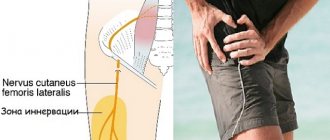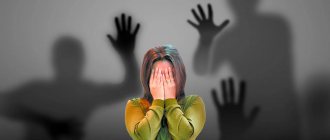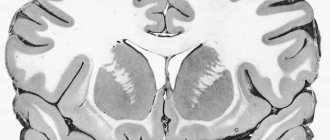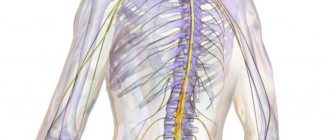Lichko classification[ | ]
Astheno-neurotic[ | ]
The astheno-neurotic type is characterized by increased fatigue and irritability. Astheno-neurotic people are prone to hypochondria, they have high fatigue during competitive activity. They may experience sudden affective outbursts over an insignificant reason, an emotional breakdown if they realize the impracticability of their plans. They are neat and disciplined[2].
Hyperthymic[ | ]
The hyperthymic (overactive) type of accentuation is expressed in constant elevated mood (like hyperthymia) and tone, uncontrollable activity and thirst for communication, a tendency to scatter and not finish what is started. People with hyperthymic accentuation of character cannot tolerate a monotonous environment, monotonous work, loneliness and limited contacts, and idleness. However, they are distinguished by energy, an active life position, sociability, and a good mood depends little on the situation. People with hyperthymic accentuation easily change their hobbies and love risks[2].
Hysteroid[ | ]
See also: Histrionic personality disorder
People with the hysterical type have pronounced egocentrism and a desire to be the center of attention. They have little tolerance for blows to egocentrism, experience fear of exposure and fear of being ridiculed, and are also prone to demonstrative suicide (parasuicide). They are characterized by perseverance, initiative, communication and an active position. They choose the most popular hobbies, which they can easily change on the go[2].
Conformal[ | ]
The conformist type is characterized by conformity to the environment; such people strive to “think like everyone else.” They cannot tolerate drastic changes, breaking a life pattern, or being deprived of their usual environment. Their perception is extremely rigid and severely limited by their expectations. People with this type of accentuation are friendly, disciplined and non-conflicting. Their hobbies and sex life are determined by their social environment. Bad habits depend on the attitude towards them in the immediate social circle, which they are guided by when forming their values [2].
Labile[ | ]
The labile type of accentuation implies extremely pronounced mood swings. People with labile accentuation have a rich sensory sphere; they are very sensitive to signs of attention. Their weak side manifests itself with emotional rejection from loved ones, loss of loved ones and separation from those to whom they are attached. Such individuals demonstrate sociability, good nature, sincere affection and social responsiveness. They are interested in communication, are drawn to their peers, and are content with the role of a ward[2].
Unstable[ | ]
An unstable type of character accentuation determines laziness and reluctance to work or study. These people have a pronounced craving for entertainment, idle pastime, and idleness. Their ideal is to remain without outside control and be left to their own devices. They are sociable, open, helpful. They talk a lot. Sex for them is a source of entertainment, sexual life begins early, the feeling of love is often unfamiliar to them. Prone to consuming alcohol and drugs[2].
Psychasthenic[ | ]
The psychasthenic type determines the tendency to introspection and reflection. Psychasthenics often hesitate when making decisions and cannot bear high demands and the burden of responsibility for themselves and others. Such subjects demonstrate accuracy and prudence; their characteristic feature is self-criticism and reliability. They usually have an even mood without sudden changes. In sex, they are often afraid of making a mistake, but in general their sex life is uneventful[2].
Sensitive[ | ]
People with a sensitive type of accentuation are very impressionable, characterized by a feeling of inferiority, timidity, and shyness. Often in adolescence they become objects of ridicule. They are easily able to show kindness, calmness and mutual assistance. Their interests lie in the intellectual and aesthetic sphere; social recognition is important to them[2].
Cycloid[ | ]
See also: Cyclothymia
With the cycloid type of character accentuation, the presence of two phases is observed - hyperthymia and subdepression. They are not expressed sharply, are usually short-term (1-2 weeks) and can be interspersed with long breaks. A person with cycloid accentuation experiences cyclical mood changes, when depression is replaced by elevated mood. When their mood declines, such people show increased sensitivity to reproaches and do not tolerate public humiliation well. However, they are proactive, cheerful and sociable. Their hobbies are unstable; during periods of recession, they tend to give up on things. Sex life is highly dependent on the rise and fall of their general condition. In the elevated, hyperthymic phase, such people are extremely similar to hyperthymic people [2].
Schizoid[ | ]
See also: Schizothymia and Schizoid personality disorder
Schizoid accentuation is characterized by the individual’s isolation, his isolation from other people. Schizoid people lack intuition and the ability to empathize. They have a hard time establishing emotional connections. They have stable and permanent interests. Very laconic. The inner world is almost always closed to others and filled with hobbies and fantasies that are intended only to please oneself. They may show a tendency to drink alcohol, but in them it usually does not cause pronounced euphoria[2]. For schizoids, alcohol can play the role of “communicative doping,” that is, it facilitates contacts with other people and instills confidence[2].
Epileptoid [ | ]
The epileptoid type of accentuation is characterized by excitability, tension and authoritarianism of the individual. A person with this type of accentuation is prone to periods of angry-sad mood, irritation with affective outbursts, and searching for objects to relieve anger. Petty accuracy, scrupulousness, meticulous adherence to all rules, even to the detriment of the business, pedantry that bothers others are usually considered as compensation for one’s own inertia. They cannot tolerate disobedience and material losses. However, they are thorough, attentive to their health and punctual. They strive to dominate their peers. In the intimate and personal sphere, their jealousy is clearly expressed. There are frequent cases of alcohol intoxication with the outburst of anger and aggression[2].
Factors in the formation of character accentuations
In the formation of an accentuated character, there is undoubtedly the influence of innate personality characteristics and hereditary factors. However, even in the presence of a genetic predisposition, accentuation does not always occur. The appearance of pronounced personality traits is influenced by the following factors:
- Characteristics of the social environment. This is especially important in childhood, when the child blindly copies the behavior of adults, adopting their characteristic ways of responding.
- Conditions of education. Deforming types of upbringing include overprotection and insufficient attention, excessive demands on the child, cruel treatment, lack of emotional contact with him, fulfilling all the child’s whims, creating a “cult of illness,” and conflicting demands in upbringing.
- Communication crisis in adolescents. At this age, the breadth of interactions with others significantly exceeds the psychological competence of the individual, which can lead to psychological discomfort and its compensation by accentuation of character.
- Inability to satisfy personal needs. Obstacles in achieving them, an authoritarian management style in a school or family increase the likelihood of accentuations.
- Disharmonious ideas about oneself. These include an unformed opinion about oneself, an inferiority complex, and an inadequate level of demands.
- Lack of interests, goals, lack of formulated ideas about needs and social norms, as well as ways to achieve them. This factor is very relevant in adolescence.
- Health status. Chronic diseases, especially pathology of the nervous system, congenital or acquired physical defects.
- Professional activity can also have a strong influence on personality traits. Professional deformations of character are often noticed among doctors, teachers, actors, and military personnel.
Accentuation of character using the example of literary characters and film heroes
Often, book authors or screenwriters endow their characters with extremely vivid personalities that can perfectly illustrate the types of character accentuation.
- The dysthymic (unstable) type is perfectly shown in the role of Pierrot from The Adventures of Pinocchio. His life is joyless, his mood is constantly depressed, his sleep is disturbed, and his attitude to all events is pessimistic.
- The pedantic (asthenic) type is the donkey Eeyore from the Russian cartoon about Winnie the Pooh. He is wary of the world around him, afraid of grief and disappointment. Avoids communication because he expects all sorts of meanness or attacks. Constantly analyzes the health of herself and her loved ones.
- Introverted (schizoid) type - White Knight from Alice in Wonderland. Unsociable, prefers solitude, intellectually developed. Gravitates towards exact sciences. Sedentary.
- Excitable type (epileptoid) – cat Matroskin. In his opinion, he knows life very well and loves to teach others, and he often turns out to be right. Active, but within reason. Extremely values his own opinion and condemns those around him for opinions that differ from his. Good owner. Another typical representative of this type is Winnie the Pooh. Optimistic, active, does everything his own way, immune to criticism. He creates chaos around himself, which corresponds to his internal state. At the same time, he can be quite talented.
- Demonstrative type (hysterical) - Carlson. Always tries to stand out, boastful, narcissistic. Avoids danger. Seeks to be the center of attention. Creates a vivid picture of the world.
- Anxious type. Nut from the cartoon "Chip 'n' Dale Rescue Rangers." She feels responsible for everything that happens, worries about the quality of work and its results. I am ready to work as long as necessary to achieve what I have planned. Honest, law-abiding, punctual.
- Emotional (labile) type of character accentuation - Princess Nesmeyana. When she is in a bad mood, the world is cruel and sad. As soon as the mood changes, life blossoms and everything around seems beautiful.
- The stuck (paranoid) type is the heroes of American comics (Superman, Spider-Man). Always ready to help, regardless of your own well-being. Active, active, decisive, purposeful. Confident in the correctness of your opinion. For them, life is a struggle.
- Hyperthymic type – Masha from the cartoon “Masha and the Bear”. Active, restless, noisy, loves to play pranks, not disciplined enough, has many superficial hobbies, always in a good mood.
- Extroverted (conformal) type – Fisherman from “The Tale of the Fisherman and the Fish.” A person who adapts to the opinions and demands of others.
- Cycloid type - Don Quixote by Cervantes, partly Alice from "Alice in Wonderland" - characters with periods of increased and decreased activity, which are accompanied by corresponding changes in mood and view of what is happening - during the period of activity the character is optimistic and joyful, during the period of passivity - sad.
- The exalted type is King Julian from The Penguins of Madagascar. Bright, cheerful, exaggeratedly demonstrating emotions, attracting maximum attention.








